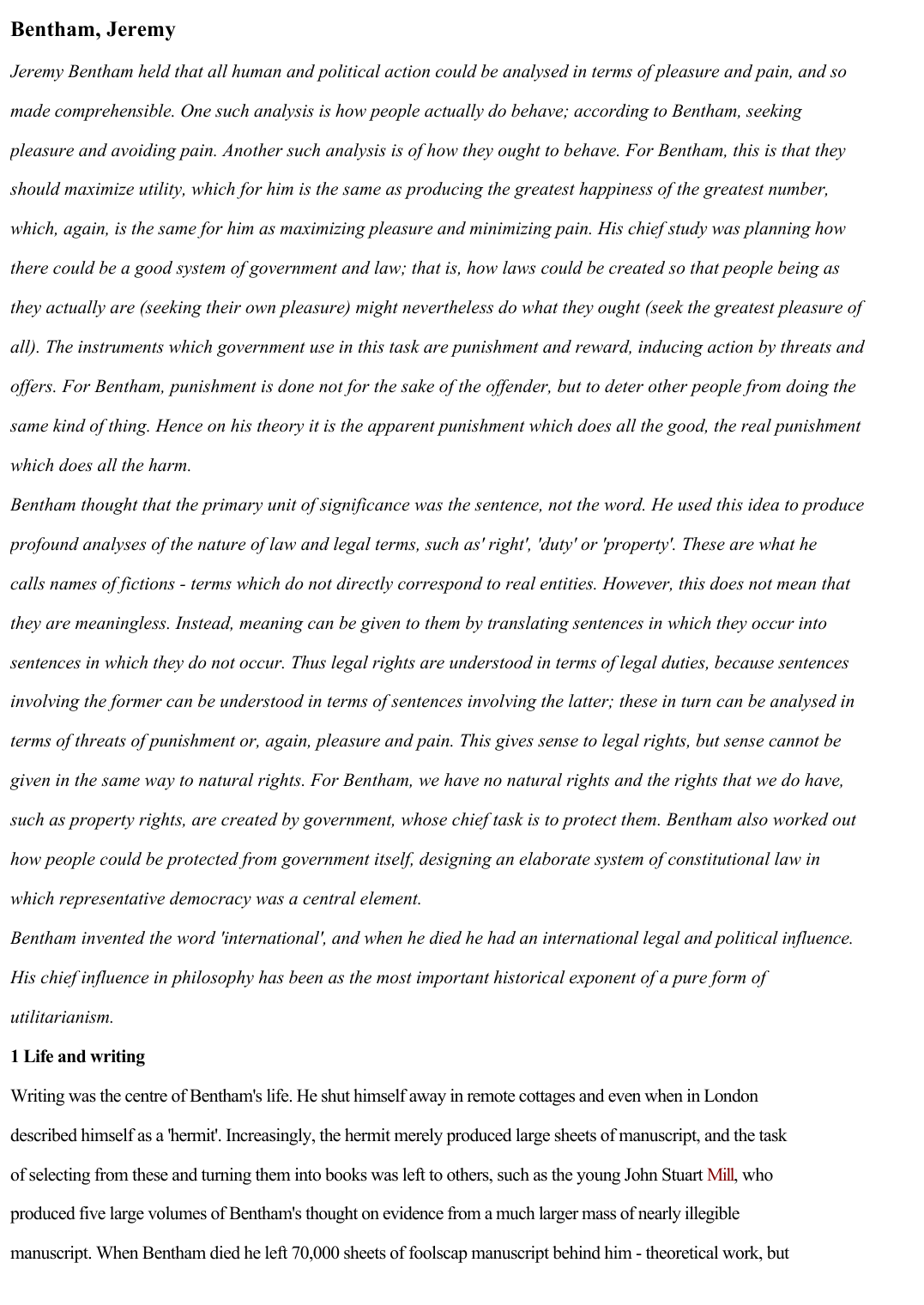Bentham, Jeremy
Publié le 16/05/2020
Extrait du document
«
Bentham, Jeremy
Jeremy Bentham held that all human and political action could be analysed in terms of pleasure and pain, and so
made comprehensible.
One such analysis is how people actually do behave; according to Bentham, seeking
pleasure and avoiding pain.
Another such analysis is of how they ought to behave.
For Bentham, this is that they
should maximize utility, which for him is the same as producing the greatest happiness of the greatest number,
which, again, is the same for him as maximizing pleasure and minimizing pain.
His chief study was planning how
there could be a good system of government and law; that is, how laws could be created so that people being as
they actually are (seeking their own pleasure) might nevertheless do what they ought (seek the greatest pleasure of
all).
The instruments which government use in this task are punishment and reward, inducing action by threats and
offers.
For Bentham, punishment is done not for the sake of the offender, but to deter other people from doing the
same kind of thing.
Hence on his theory it is the apparent punishment which does all the good, the real punishment
which does all the harm.
Bentham thought that the primary unit of significance was the sentence, not the word.
He used this idea to produce
profound analyses of the nature of law and legal terms, such as' right' , 'duty' or 'property' .
These are what he
calls names of fictions - terms which do not directly correspond to real entities.
However, this does not mean that
they are meaningless.
Instead, meaning can be given to them by translating sentences in which they occur into
sentences in which they do not occur.
Thus legal rights are understood in terms of legal duties, because sentences
involving the former can be understood in terms of sentences involving the latter; these in turn can be analysed in
terms of threats of punishment or, again, pleasure and pain.
This gives sense to legal rights, but sense cannot be
given in the same way to natural rights.
For Bentham, we have no natural rights and the rights that we do have,
such as property rights, are created by government, whose chief task is to protect them.
Bentham also worked out
how people could be protected from government itself, designing an elaborate system of constitutional law in
which representative democracy was a central element.
Bentham invented the word 'international' , and when he died he had an international legal and political influence.
His chief influence in philosophy has been as the most important historical exponent of a pure form of
utilitarianism.
1 Life and writing
Writing was the centre of Bentham's life.
He shut himself away in remote cottages and even when in London
described himself as a 'hermit' .
Increasingly, the hermit merely produced large sheets of manuscript, and the task
of selecting from these and turning them into books was left to others, such as the young John Stuart Mill , who
produced five large volumes of Bentham's thought on evidence from a much larger mass of nearly illegible
manuscript.
When Bentham died he left 70,000 sheets of foolscap manuscript behind him - theoretical work, but.
»
↓↓↓ APERÇU DU DOCUMENT ↓↓↓
Liens utiles
- Jeremy Bentham : le taux d'intérêt
- BENTHAM
- Jeremy Bentham1748-1832Né à Londres, est à l'origine du radicalisme anglais
- JEREMY TAYLOR

































